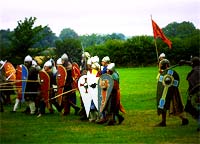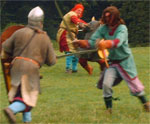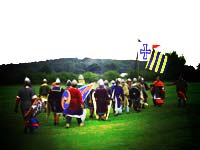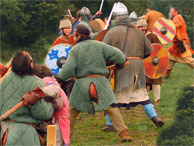King Aelfred (Alfred)
Alfred the Great - A Short Biography
Often considered the first King of "England", Alfred lived from 849 to 899 and reigned as King of Wessex from 879. He is well known for one of the myths that surround him - the story that he burned cakes in a peasant home. The story is that, in disguise, hiding from the Danes in the Athelney marshes, Alfred begged refuge from a peasant household, where he was asked to carry out tasks, including watching the food cooking on the fire. Preoccupied, and unaccustomed to cooking duties, he let the cakes burn and ruined the household's meal. The woman of the house scolded him severely.
 It is hard to see why this myth has such staying power. There seems to be no punchline, except that the woman was mortified to find out that she had chided the king. It also seems to betray an anachronistic idea about aristocracy in the Saxon era that might fit better with the Normans. (In fact, the Royal family website says that this myth dates from the 12th century.) Saxon kings were surely more like war chieftains than like aristocrats used to living in idle luxury. One possible subtext of the story is that Alfred learned to appreciate the ordinary peasant's concerns during his time spent as a guerilla fighter evading the Danes.
It is hard to see why this myth has such staying power. There seems to be no punchline, except that the woman was mortified to find out that she had chided the king. It also seems to betray an anachronistic idea about aristocracy in the Saxon era that might fit better with the Normans. (In fact, the Royal family website says that this myth dates from the 12th century.) Saxon kings were surely more like war chieftains than like aristocrats used to living in idle luxury. One possible subtext of the story is that Alfred learned to appreciate the ordinary peasant's concerns during his time spent as a guerilla fighter evading the Danes.
 Alfred was the fifth son of King Aethelwulf of the West Saxons (Wessex). Wessex was an area of scattered settlements, with woodland and good quality farmland. Alfred was born in 849, in Wantage (in modern Berkshire). From around 870, armies made up of thousands of Viking raiders were raiding the coasts and rivers of England from their fast and efficient longships. Raids were giving way to the establishment of permanent Danish settlements. In 867, the Vikings set up a kingdom in York. They defeated the other main Anglo-Saxon kingdoms, East Anglia and Mercia.
Alfred was the fifth son of King Aethelwulf of the West Saxons (Wessex). Wessex was an area of scattered settlements, with woodland and good quality farmland. Alfred was born in 849, in Wantage (in modern Berkshire). From around 870, armies made up of thousands of Viking raiders were raiding the coasts and rivers of England from their fast and efficient longships. Raids were giving way to the establishment of permanent Danish settlements. In 867, the Vikings set up a kingdom in York. They defeated the other main Anglo-Saxon kingdoms, East Anglia and Mercia.
This left Wessex alone when the Vikings attacked in 870. The Wessex army was led by King Aethelred (Alfred's older brother) and Alfred. Despite Alfred's having beaten the Vikings in an uphill assault at the battle of Ashdown in 871, the Vikings were winning. When Aethelred died, the 21-year-old Alfred became King of Wessex and, therefore, the leader of the resistance against the Vikings. King Guthrum's Danes took Chippenham in Wiltshire, in 878, and used it as their base for further attacks in the area.
 Alfred was almost without allies, except Aethelnoth earldorman of Somerset, and had few fighters - his royal bodyguard and a small army of thegns. He was forced to hide in the Somerset tidal marshes. Alfred devised new tactics, partly based on his experience of the Danes' fighting methods. He set up a fortified base at Athelney, from where he directed a guerilla campaign, with fighters from Wiltshire, Somerset and Hampshire.
Alfred was almost without allies, except Aethelnoth earldorman of Somerset, and had few fighters - his royal bodyguard and a small army of thegns. He was forced to hide in the Somerset tidal marshes. Alfred devised new tactics, partly based on his experience of the Danes' fighting methods. He set up a fortified base at Athelney, from where he directed a guerilla campaign, with fighters from Wiltshire, Somerset and Hampshire.
 At the battle of Edington in 878, his army defeated the Danes and chased them back to Chippenham. The Vikings sought peace and Alfred sponsored King Guthrum's baptism. Alfred succeeded in freeing London in 886 and made the treaty of Wedmore with Guthrum and the East Anglians.
At the battle of Edington in 878, his army defeated the Danes and chased them back to Chippenham. The Vikings sought peace and Alfred sponsored King Guthrum's baptism. Alfred succeeded in freeing London in 886 and made the treaty of Wedmore with Guthrum and the East Anglians.
Under the terms of this treaty, England was to be divided along the line of Roman Watling Street, with land with the area between the Thames and Tees Rivers being ceded to the Danes and land to the west controlled by the Saxons. Alfred had now expanded his territory to include kingdoms outside Wessex (West Mercia and Kent.)
He undertook a series of defensive measures to consolidate his position and bring about lasting peace.
Alfred built upon his experiences in fighting the Danes to strengthen the defences of the lands under his control. He built new forts and strengthened existing ones. He fortified settlements throughout Southern England, giving rise to the concept of the English borough from the Saxon word for a fortress (burh) The burhs were centred on Alfred's capital in Winchester and were sited so that none would be more than 20 miles away from another, to provide assistance in case of invasion. Plots of land were distributed to settlers in return for military service.
He built up a navy to fend off the continuing coast raids and equipped it with large ships built to his own design.
He organised his army (thegns and the fyrd militia) on a rota basis. This was to ensure that there were always fighting men available to defend the country without leaving agricultural land neglected.
Alfred also carried out diplomatic measures to strengthen the likelihood that peace would last. He made alliances through marriage, including his own marriage to a Mercian and his daughter's to a Viking. He allied with Wales, which even provided troops for his army. Another marriage brought alliance with the Flemish, who had a strong navy that he could call upon if needed.
Thus Alfred achieved a great deal in consolidating scattered settlements and securing the territory against Viking invasion. He also carried out numerous social measures. He set up a code of laws, based on the codes of Aethelbert of Kent, Ine of Wessex, Offa of Mercia and the Biblical Book of Exodus. These laws restrained blood feuds and set heavy penalties for breach of oath.
Alfred put a great value on education. He learned Latin and translated some Latin texts into English himself. He acted as patron to Welsh and European scholars.